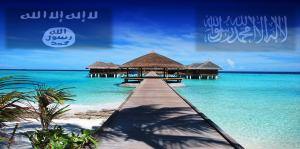The recent attack by the Islamic State (ISIS) in the city of Malé, a popular honeymoon destination in the Maldives, may come as a surprise to many. The idyllic holiday destination doesn’t tend to conjure up images of an environment conducive to recruitment by terrorist groups. But, in fact, almost 200 individuals left this area to fight alongside terrorist groups in Syria following the expansion of ISIS in the summer of 2014, assisted by the Syrian state’s war on its population. There are thirty-plus known individuals hoping to return to the Maldives, like reported by eeradicalization.com.
The environment in Malé is completely different to the tourist islands. It boasts of being 100% Muslim in its citizenry and the values it espouses are conservative and Islamic. As such, unlike on the islands for foreign holidaymakers, there is no sale of alcohol. This cleavage is becoming ever-more evident, reflected in an increasingly polarised society, both culturally and politically.
Within these areas, the traditional Muslim identity — historically connected with the institution of Al-Azhar University in Egypt — is coming under challenge from two directions.
People will often describe the traditional view of Islam in the Maldives in order to contrast it with the rise of unreconstructed Wahhabism — not the type of Salafi/Wahhabi thought often described as politically “quietest”, or developed from the early revolutionary movement.
To illustrate the difference, there have been attempts by traditionalists to deal with modernity. For example, on women’s rights and place in an overtly identifying Muslim society, it is not uncommon to see young women in hijabs driving motorcycles throughout the capital and there are female heads of multiple ministries. By contrast, the hardline revolutionary Wahhabi thought opposes this attempted integration and this doctrine is being promoted on the island.
In one Islamic bookstore, primitivist works on ‘Jihad in Qur’an and Sunnah’ written by hardline Wahhabi clerics advocate for al-Wala wal-Bara (a concept of having fealty and loyalty only with other Muslims who share the right beliefs only i.e. Salafis, and actively having to disavow everyone else), and these theological texts exist alongside more overtly politicized works influenced by Muslim Brotherhood ideologues like Sayyid Qutb, promoting civilisations conflict and rejecting human rights and democracy, such as the polemical, ‘The Clash of Civilisations’ by Bilal Philips, a Canadian convert and supporter of suicide bombing.
This combination of Wahhabism and modern political Islamism has created huge conflicts in the society, which are still being worked out, a process that has been ongoing for many years in the civil society space.
From the other direction, there are reformist voices, various civic actors and political groups, some of whom have been met with accusations of blasphemy that have furthered polarisation in the society. Liberal activists are being criticised for insulting the religion of Islam, and even the dissolution of various democratic movements, thereby supposedly damaging the “unity” of a 100% Muslim society.
This ideological and identity conflict on its own does not explain the recruitment to ISIS and Al-Qaeda, nor does the geopolitical context in Syria. But understanding the local dynamics helps build a picture of a large proportion of young people in the Maldives. Disenfranchised and internally migrating from the islands to the capital, these young people lack education and face the growing problem of gangs and drugs, an atomized and unstable situation that social activists believe provides a strong recruitment pool of vulnerable people, against the backdrop of an ever-more radicalized version of Wahhabi-Islamism, and ideological conflict within the society.
The political landscape suffers from tensions around its own ideological make up and political persuasions, between those who see India as an ally and those who align themselves closer to Pakistan, and those who see the conception of secular governance as either religiously inclusive or exclusive. These debates divide the society. Like Pakistan, the concept of secularism seems almost reductionist to some; the very word to describe it, la-deeni, literally means not religious and has connotations with a desire to remove religion from society. On the other side is an inclusive concept of secularism as religious neutrality, as seen in India and Bangladesh.
These broader debates around identity, religious pluralism, the nature of radicalism and extremist ideology, and the polarization by mainstreaming either extremist ideologies or anti-religious politics, has created an environment conducive to the recruitment of vulnerable young men.
This stark reality is a challenge facing the current government in the Maldives, which is trying to figure out ways to reintegrate its returning foreign fighters. The issues of what kind of society, religious persuasion, and sense of Maldivian identity to integrate and re-belong to for such individuals are the questions that contextualize the current debates surrounding deradicalization and management of the security concerns related to ISIS and Al-Qaeda.



